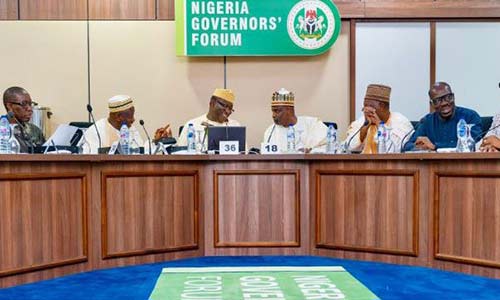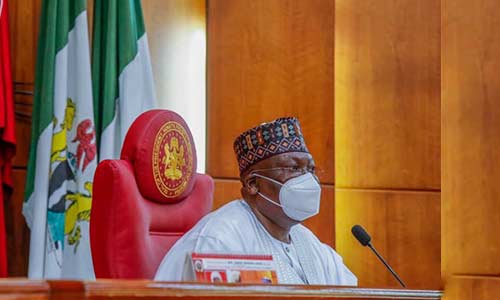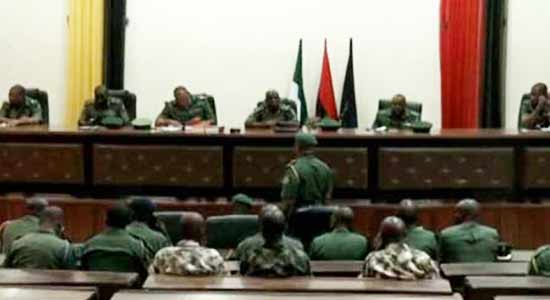LEGAL NEWS UPDATES 21/12/2021
Governors and Practise of Running Local Councils with Committees, Administrators

The tenures of democratically elected governors of the 36 states of Nigeria have since the inception of democracy been administered unhindered, except in cases of staggered elections ocassioned by court decisions. The tenure of these governors runs without being truncated by the president through any political manipulation as required by law, but the same cannot be said of the third tier of government.
Governors at the slightest opportunity, advance all manner of excuses to sack or dissolve the elected local government council members and sometimes even refuse to conduct new elections for months or even years.
However unhealthy this incongruous system of using caretaker committees or sole administrators in the place of democratically elected local government council members are, the practice, unfortunately has persisted. This is in spite of the letter by the Office of the Attorney General of the Federation, Abubakar Malami (SAN), directing all state governments to comply with the Supreme Court’s judgment forbidding governors and legislatures from dissolving elected council officials.
The letter notified states of the illegality of running caretaker committees in place of elected officials at the local governments. Mr Malami’s letters had called for the immediate disbandment of caretaker committees and the restoration of elected local governments. His memo drew strength from the Supreme Court judgment last year in a case brought by sacked local government chairpersons in Ekiti State, which declared as illegal the governors’ removal of elected officials of local councils.
Dissatisfied with the Appeal Court judgment in favour of the sacked council chairpersons, the Ekiti State Government challenged the decision at the Supreme Court. The Supreme Court in the judgment nullified the power of state governors, derived from laws passed by the Houses of Assembly, to sack elected Local government chairmen. It also stopped the state Houses of Assembly from empowering governors to replace the sacked chairmen with interim Administrators. By implication, the apex court declared as illegal use of administrators at the local levels not duly elected as provided for in the 1999 Constitution.
Unfortunately, some of the governors, in their desperation to manipulate the system, often go as far as withholding funds meant for local governments such that development at the grassroots suffer. More worrisome is their crude tactics that also sometimes shorten the tenure of elected local councils. In some states, it is as little as two years, which makes it virtually impossible even for the elected chairmen and councillors to settle down and undertake any meaningful projects.
Sokoto and Oyo state governments sacked elected officers, whose tenures had not ended and replaced them with caretaker committees. Edo State has used caretaker committees, in the place of the local government elected executive officers, as heads of administration were administering the council. Among the other states of the federation that are still in this illegal practice include Katsina, Anambra, Kwara, Osun, Zamfara and Sokoto.
Reacting to the development, Council Member, Nigerian Bar Association Section on Public Interest and Development Law and former Member, NBA Criminal Justice Reform Committee, Emeka Nwadioke lamented that governors have hijacked local government administration to bolster their political influence at the expense of the Nigerian electorate whose right to elect local council officials is being usurped with impunity. Corruption, he pointed out, is also at the root of the battle for control of local councils, especially where some Governors compel their council appointees to sign off on funds they never received.
He said: “It is clearly an anathema and a national embarrassment that some governors have decided to operate outside the ambit of Nigeria’s Constitution to administer local councils by proxy and through unelected caretaker committees or worse still, sole administrators. Anambra State has the unenviable record of its councils being unelected for an unbroken 10 years even under a democratic dispensation.
“State governors who fail to conduct local council election are in breach of Section 7 (1) of the Constitution. Ideally, it is an impeachable offence. Sadly, the governors pay scant regard to this grievous constitutional infraction because most of our State Houses of Assembly are mere appendages to the Governor’s Office. When the governors ask them to jump, they simply ask, ‘how high, sir?’ This is the pathetic state of our democracy today.
“Even when some governors go through the ‘coronation exercises’ called local council elections, the entire exercise is enveloped by massive voter apathy because the results are long foretold before the elections. I recall that INEC Commissioner, Mike Igini aptly called such elections “organised crime.” This should worry all of us deeply.
“There has to be consequences for governors who breach the Constitution. Given that local council funds are a prime target of many governors, and in the absence of the constitutionally mandated Joint Local Government Accounts Committee, an Executive Order may enure to stem payment of local council allocations to governors who fail to conduct council elections.”
Nwadioke recalled that the Supreme Court had in the Ekiti case affirmed the sanctity of tenure of elected local council officials, such that they can no longer be arbitrarily removed. According to him, it remains for opposition parties to prove their mettle by challenging errant governors, while the framework for appointment of state electoral commissions are revisited. He argued that a more sustainable framework would be a full-blown local government autonomy.
For Wahab Abdullah, a lawyer, it is unlawful for governors to appoint sole administrators for local councils. According to him, it is condemnable and not in tandem with the laws and the Constitution. He stressed that it is on record that the courts in Nigeria, especially the Supreme Court in different judgements have also pronounced on the running of the councils by administrators or under whatever name or styles by the state governments.
In some of the judgments from the courts of record, he explained, it was held that removing elected local government officials by the governor through fiat of the governor or other unconstitutional means is illegal. He added that the court have came down heavily on governors who rather than conducting election into the local government offices appointed caretakers.
He noted that majority of the state govrrnors rely on the laws enacted by their Houses of Assembly under Section 7 of the 1999 Constitution, which mandates state governments to make laws “which provides for the establishment, structure, composition, finance and functions of such councils.”
Abdullah argued that local government as their tier of government is a sub-division of a nation state that ought to enjoy its constitutional independence. It is, he stated, meant to be constituted by law, including the election of it’s political office holders and to also possesses control of it’s local affairs including the power to impose certain taxes or engage labour for identified purposes.
“However, the Supreme Court had in recent separate judgments delivered on May 7, 2021, held that the dissolution of elected local government administrations in Oyo and Katsina States by their respective State governments, is illegal and unconstitutional.
“The local government administration in Oyo and Ekiti States in collaborations with their elected officials took the bull by the horns and challenged the state governors, urging the court to determine whether they had powers to dissolve the two local councils.
“In their brief, the Plaintiffs (Council officials) argued that the purported dissolution of their councils was in violation of section 7(1) of the Nigerian Constitution, which provides as follows: “The system of local government by democratically elected local government councils is under this Constitution guaranteed; and accordingly, the Government of every State shall, subject to section 8 of this Constitution, ensure their existence under a law, which provides for the establishment, structure, composition, finance and functions of such councils,” he stated.
He explained that the practice of using council administrators has taken roots in the country as a result of efforts of the governors to control the finances and choice of loyal candidates in their local government councils.
Abdullah said: “To address some of these anomalies, apart from the judgments on Ekiti and Oyo States, the courts of record have dealt with the situation in the case of EZE VS GOVERNOR ABIA STATE (2014) 14 NWLR (PT. 1426) 192.
“ On whether governors can dissolve elected local government council; Section 7 of the 1999 Constitution imposes a duty on the governor of a state to ensure that the system of Local Government continues unhindered. A governor who dissolves or appoints sole administrators or caretakers to run the affairs of the councils, is doing so illegally. It is unknown to Nigerian laws.”
Citing more authorities, he stated that the Supreme Court as Per AKAAHS, J.S.C. as he then was at page 220, paras. C-H- held: “The frequent dissolution of local governments and appointment of caretaker councils by State Governors in this country is not only illegal but highly undemocratic as section 7(1) of the 1999 Constitution guarantees the existence of democratically elected local government councils.
“If general elections are held every four years to elect the President, Governors and members of the National and State Assemblies, there is no justifiable reason, except where a state of emergency has been declared, for a State Governor to dissolve a Local Government and appoint a caretaker council in its place.”
Puis Danba, a lawyer, said Nigeria would be rescued from such self-destruction when Local Government administration is allowed to run seamlessly in accordance with the Constitution. He said Section 7 of the Constitution guarantees a democratically elected local administration in Nigeria.
“Unfortunately, most state governors have reduced the local governments to what may be seen as their private business venture. They hire and fire local government chairmen at will and thereby usurp the powers of the electorate,” he pointed out.
According to him, the Supreme Court has frowned on it as illegal and Unconstitutional. “But of course, Nigerians condone Constitutional breach a lot. Otherwise, we should see most of these governors losing their seats. The law is that once a governor deliberately breaches a provision of the Constitution, he should be removed from office. To reset the button and get local government administration working, we need a vigilant citizenry that will call for impeachment of any governor that fails to have a democratically elected local government administration,” he declared.
The lawyer advised that the Federal Government must also be on the side of the people. The governors, he argued, cannot be heard to demand full autonomy from the Federal Government while in turn denying Local Governments autonomy. “That is a double standard and should be discouraged,” he said.
Another lawyer, Allen Sowore, declared that the deliberate and continuous imposition of undemocratic structures on the local government areas in Nigeria by the state governors, more often than not, exposes the hypocrisy and dishonesty of the governors when they demand for the implementation of true federalism.
Sowore argued that the 1999 Constitution is very clear and unambiguous in its provisions as regard the issue. According to him, section 1 ( 1) says “This Constitution is supreme and its provisions shall have binding force on all authorities and persons throughout the Federal Republic of Nigeria.”
The lawyer further pointed out that section 1(2) says “The Federal Republic of Nigeria shall not be governed or its government taken control of by any person or group of persons except in accordance with the provisions of the Constitution.”
According to him, Section (7) of the Constitution specifically said that the system of local government by democratically elected local government councils is guaranteed under the Constitution.
“Now, a community reading of these provisions makes the emplacement of caretaker committees or interim management committees or whatever the nomenclature different from a democratically elected council as provided for by the Constitution an affront, illegal and an aberration. Just as the President cannot appoint caretaker committees to oversee the affairs of a state, the governors too can’t appoint their cronies to administer local governments.
Emma Ekwe, an Abuja based lawyer, declared that the setting up of local government caretaker committees by state governors is a complete aberration to the Nigerian Constitution. He argued that there is no provision in the 1999 Constitution, for the appointment of a caretaker as chairman of local government.
According to the lawyer, in the case of the GOVERNOR, EKITI STATE VS OLUBUNMO (2017) 3 NWLR (Pt. 1551) 1, the Court as per Justice Nweze JSC at page 36, para C-D, held: “I, therefore, hold that, having been elected for a tenure of three years under the Ekiti State Local Government Administration Law Cap L11, the respondents could only ‘be removed from office if found to be in breach of the rules governing the office … 215 – 216 or by proof that it was in the overriding public interest. That was not shown in this case. In totality, there must be Constitutional guarantee of democratic local government system in the country.”
He argued that a joint reading of Sections 8 4(6) and 7(1) of the Constitution reveal that a State House of Assembly is empowered to make laws for the function of local government councils, provided such laws do not tamper with or abrogate the guaranteed existence of the democratically elected councils in the state. “To this end, I am of the firm opinion that any intervention in the running of the local government by the Executive governors of the state is a violations of the provisions of the Constitution,” he declared.
Abuja-based legal practitioner, Terkaa Aondo attributed the practice by governors to parochial interests. Aondo argued that governors who are clearly in breach of the Constitution see the control of local government chairpersons as a means syphoning revenue meant for the local governments by appointing their stooges and loyalists.
Another lawyer, Godwin Ogboji also described the practice as illegal. According to him, the courts had on various occasions held that it was unconstitutional and an aberration. The lawyer pointed out that there are instances of court pronouncements. He mentioned Benue, Oyo and other states in the south west as examples of states where the court had awarded damages to those unconstitutionally removed from office as elected local government officials.
“What the governors are doing is daring the law. They are contravening the laws. The issue of the caretaker committee is an aberration. It is not known to the law. Just as the president cannot run the states with administrators except in rare cases of a state of emergency, a governor also cannot remove a chairman.”
“I want to suggest that courts should start criminalising this issue. Although a governor would not be prosecuted while in office, such governor should be deemed to have committed a crime and be prosecuted after office,” he suggested.
According to the lawyer, in view of the provisions of Section 7(1) of the 1999 Constitution, it is totally illegal and Unconstitutional. He said: “This unconstitutional act has become a tradition in the states. Can the president appoint caretaker governors? The answer to this question demonstrates the illegal act practiced by the governors. Moreso, the Supreme Court in a five-man panel headed by Justice Olubolade Joe, in a unanimous judgment delivered on December 11 2019, strips state governors of the power to sack elected local government chairmen and councilors. The appointment of caretaker chairmen by state governors has also been banned by the same court ruling.”
The lawyer admonished state governors, and non-state actors to stop the illegal practice of appointing caretakers to run the affairs of Local Government Areas. “We should collectively fight the illegality of appointing a caretaker committee for local government,” he said.
Caleb Ramnap, also an Abuja based lawyer, described the use of a caretaker committee to run a local government council as unconstitutional. He called on all the stakeholders within the local government councils to wake up and challenge the unconstitutional use of caretaker committees by the governors.



